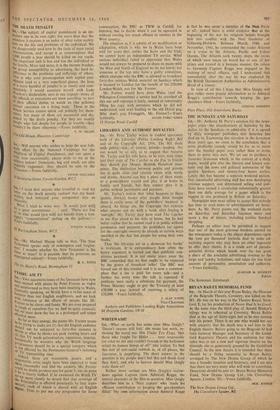LIBRARIES AND AUTHORS' ROYALTIES
SIR,—Mr. Peter Turley writes in evident ignorance both of the Libraries (Public Lending Right) Bill and of the Copyright Act, 1956. The Bill deals with public—not, of course, private—lending. No one would be so silly as to suggest that because Mr. Turley and his wife have, as he says, nine times lent their copy of The Catcher in the Rye to friends they should pay Messrs. Hamish Hamilton nine- pence. The distinction between public and private use is quite clear and already exists with music and drama. Anyone can buy a piece of Sheet music or a gramophone record and play it at home to family and friends, but they cannot play it in public without permission and payment.
Mr. Turley's notion that 'what happens to these [public library] books after people have bought them is really none of the publishers' business' is absurd. As things are, the Copyright Act restricts what anyone can do with a book after buying it 'outright.' Mr. Turley may have read The Catcher in the Rye aloud to his wife at home, but he had better realise that he cannot read it in public without permission and payment. So publishers (as agents for the copyright owners) do already in certain ways specified in the Act 'tax people for using their own books.'
That 'the libraries act as a showcase for books' is irrelevant. It. is extraordinary how often the hoary argument is trotted out that publicity con- stitutes payment. It is not many years since the BBC contended that no fees ought to be expected by the givers of broadcast talks! The BBC was forced out of this evasion and it is now a common- place that a fee is paid for every talk—and a
further fee every time the talk is repeated. If publicity were really a substitute for payment, the Prime Minister ought to pay the Treasury at least £50,000 a year instead of receiving a salary of £10,000.—Yours faithfully,
J. ALAN WHITE Vice-Chairman Authors and Publishers Lending Right Association 84 Drayton Gardens, SW 10


































 Previous page
Previous page